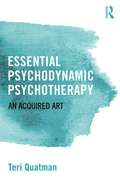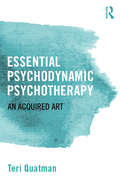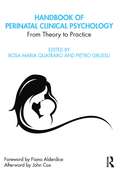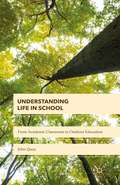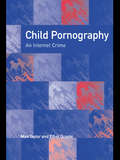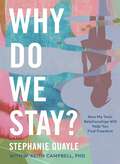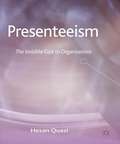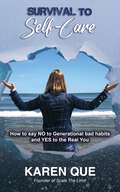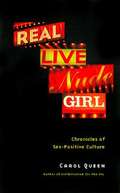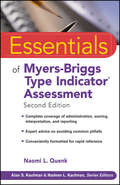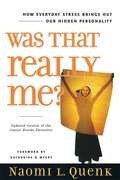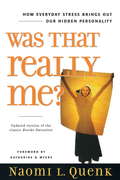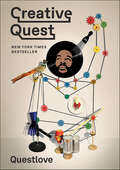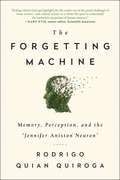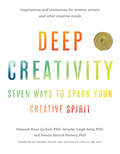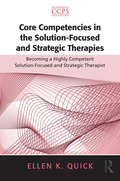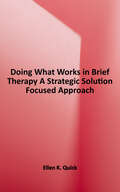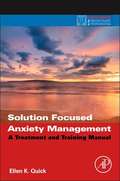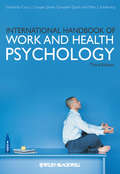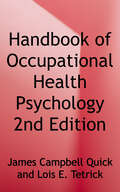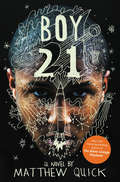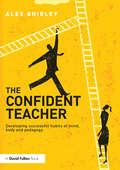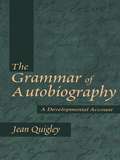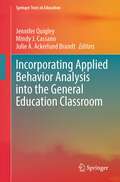- Table View
- List View
Essential Psychodynamic Psychotherapy: An Acquired Art
by Teri QuatmanEssential Psychodynamic Psychotherapy: An Acquired Art provides an essential, accessible grounding in current psychodynamic theory and practice for a wide range of readers. For trainees, it offers a very useful toolset to help them make the transition from purely theoretical training to the uncharted territory of clinical practice. For more seasoned therapists and those seeking to deepen their understanding of psychodynamic therapy, it provides conceptual clarity, and may also serve as a stepping stone to more complex and denser psychoanalytic works written for advanced clinicians.
Essential Psychodynamic Psychotherapy: An Acquired Art
by Teri QuatmanEssential Psychodynamic Psychotherapy: An Acquired Art provides an essential, accessible grounding in current psychodynamic theory and practice for a wide range of readers. For trainees, it offers a very useful toolset to help them make the transition from purely theoretical training to the uncharted territory of clinical practice. For more seasoned therapists and those seeking to deepen their understanding of psychodynamic therapy, it provides conceptual clarity, and may also serve as a stepping stone to more complex and denser psychoanalytic works written for advanced clinicians. Essential Psychodynamic Psychotherapy: An Acquired Art is an introduction to how to think and work psychodynamically. It is written primarily for those training at a postgraduate level in psychoanalysis and psychodynamic psychotherapy, but reaches well beyond that audience. It is grounded in contemporary psychoanalytic theory, drawing on the work of Winnicott, Bion, and Ogden, all of whom are pivotal in current psychodynamic thought and practice. It also integrates attachment theory and research, and includes fresh contributions from neuropsychological research. The voice of the book is honest and intimate. The tone is practical. It is written with a clear-minded understanding of contemporary psychodynamic theory that allows the new therapist to access the deepest and richest parts of the therapy itself. It translates many of the key theoretical tenets of psychodynamic psychotherapy, giving the reader a clear (but non-formulaic) guide as to how handle the contours of any analytic session; how to open one’s perceptual and emotional apertures as clinician; how to work in and understand "the relationship"; and how to work with the most common intra- and interpersonal problems patients present. This publication will be a valuable guide for new analysts and therapists, and also for those seeking to understand what the world of psychodynamic therapy may hold for them, no matter where they are in their clinical careers. Dr. Teri Quatman is an Associate Professor of Counseling Psychology in the Graduate Department of Counseling Psychology at Santa Clara University. She earned her Ph.D. from Stanford University in 1990, and has studied, practiced, and taught psychodynamic psychotherapy to graduate students for the past 25 years.
Handbook of Perinatal Clinical Psychology: From Theory to Practice
by Rosa Maria Quatraro Pietro GrussuThe book examines the major issues in perinatal clinical psychology with the presence of theoretical information and operational indications, through a biopsychosocial approach. The multiplicity of scientific information reported makes this book both a comprehensive overview on the major perinatal mental health disorders and illnesses, and a clinical guide. It covers perinatal clinical psychology through a journey of 15 chapters, putting the arguments on a solid theoretical basis and reporting multiple operational indications of great utility for daily clinical practice. It has well documented new evidence bases in the field of clinical psychology that have underpinned the conspicuous current global and national developments in perinatal mental health. As such, it is an excellent resource for researchers, policy makers, and practitioners – in fact, anyone and everyone who wishes to understand and rediscover, in a single opera, the current scientific and application scenario related to psychological health during pregnancy and after childbirth.
Understanding Life in School: From Academic Classroom to Outdoor Education
by John QuayAttending school is an experience that most people share but this leads us to accept rather than question the experience. Using the philosophies of Heidegger and Dewey, John Quay explores life in schools and juxtaposes the environment of a school camp with that of an academic classroom.
Child Pornography: An Internet Crime
by Ethel Quayle Max TaylorChild pornography, particularly that available via the Internet, has become a cause of huge social concern in recent years. This book examines the reality behind the often hysterical media coverage of the topic. Drawing on extensive new research findings, it examines how child pornography is used on the Internet and the social context in which such use occurs, and develops a model of offending behaviour to better help understand and deal with the processes of offending. Detailed case studies and offenders' own accounts are used to illustrate the processes involved in offending and treatment.The authors argue that we need to refine our ideas of offending, and that while severe deterrents need to be associated with possession of child pornography, a better understanding is needed of the links between possession and committing a contact offence. Only by improving our understanding of this complex and very controversial topic can we hope to deal effectively with offenders and with their child victims. This is a book which will become an essential read for anyone involved with offenders or victims from a psychological, judicial or social background.
Why Do We Stay?: How My Toxic Relationship Can Help You Find Freedom
by Stephanie QuayleYou or someone you love may be in a toxic relationship, but it doesn't have to stay that way. In this compassionate and practical resource, Stephanie Quayle shares her powerful story alongside psychologist Dr. W. Keith Campbell's professional insights to give you the help and hope you need—and remind you that you are not alone.When Stephanie lost her boyfriend in a plane crash, she faced intense grief and pain. Nothing compared, though, to the shock of discovering she had not been the only woman in his life. As her world unraveled around her, Stephanie realized that it had actually been unraveling from the start of their relationship—back when he promised her everything.In Why Do We Stay? Stephanie draws on her story to explain how to spot a toxic relationship, how to get out, and how to heal. Mental health expert Dr. W. Keith Campbell joins her in helping you see that:You can make a change in your lifeThere are warning signs to look for and ways to spot an unhealthy relationshipYou don&’t have to be a victim to narcissism or gaslighting or lose years of your lifeWhether you stay in or leave your relationship, healing and freedom are possible Why Do We Stay? is ideal for:Those who feel trapped in an unhealthy relationshipThose who are recovering from a toxic relationshipReaders searching for a resource—for themselves or for a friend—on narcissism, gaslighting, compulsive lying, and other destructive behaviors With a powerful blend of clinical research, gripping storytelling, and unvarnished hope, Why Do We Stay? empowers you to make changes in your life. You are not alone.Discover a way forward.
Presenteeism
by Hesan QuaziPresenteeism presents the important issues related to the nature and extent of presenteeism and cited examples from different studies. The book discusses in depth why employees come to work despite being sick, strategies to manage presenteeism behavior and who should be taking the lead in managing such employee behavior.
Survival to Self-Care - How to say NO to generational bad habits and YES to the real you
by Karen QueSurvival to Self-Care: How to say NO to generational bad habits and YES to the real you is a story based self-help book which brings to light generational cycles and presents a seven-step process to stop passing them on to future generations. Karen Que explores how life has a way of piling on unfulfilled expectations. These help to build up varying levels of emotional armor, requiring new skills for survival. At the height of her career, feeling buried in pain at her lowest moment, she dug her way out by discovering how to identify, unpack, and release cycles which were handed down through the generations. Each purchase of Survival to Self-Care comes with a special BONUS Companion E-Journal featuring 20 pages to help you accelerate your transformation with exercises and additional tools for better self-care.
Real Live Nude Girl: Chronicles of Sex-Positive Culture
by Carol QueenHop on the express train to sexual enlightenment with sex educator and self-avowed whore Dr. Carol Queen, Whether writing about the joys of being spanked into erotic bliss, performing in a red-light district peep show, partaking of the pleasures of the new safe sex clubs, or lobbying for the pro-pornography platform, Queen is an enthusiastic advocate for sexual pleasure.
Essentials of Myers-Briggs Type Indicator Assessment
by Naomi L. QuenkQuickly acquire the knowledge and skills you need to confidently administer, score, and interpret the MBTIIn order to use the Myers-Briggs Type Indicator (MBTI) appropriately and effectively, professionals need an authoritative source of advice and guidance on how to administer, score, and interpret this test. Written by Naomi Quenk--who coauthored the 1998 revision of the MBTI Manual and the MBTI Step II Manual--Essentials of Myers-Briggs Type Indicator Assessment, Second Edition is that source.Like all the volumes in the Essentials of Psychological Assessment series, this book is designed to help busy practitioners, and those in training, to quickly acquire the knowledge and skills they need to make optimal use of major psychological assessment instruments. Each concise chapter features numerous callout boxes highlighting key concepts, bulleted points, and extensive illustrative material, as well as test questions that help you gauge and reinforce your grasp of the information covered.Completely revised and up to date with discussion of new versions of the MBTI, such as MBTI Step II and MBTIComplete, Essentials of Myers-Briggs Type Indicator Assessment, Second Edition provides expert assessment of the instrument's relative strengths and weaknesses, valuable advice on its clinical applications, and several illuminating case reports.
Was That Really Me?: How Everyday Stress Brings Out Our Hidden Personality
by Naomi L. QuenkPsychologist Naomi Quenk discusses the stress patterns that various personality types experience. Using Jungian psychological type theory and the MBTI© personality inventory, Quenk helps readers turn their moments of stress into gems of personal understanding and growth. Work-related stress and the effects of stress over time are both explored in Was That Really Me?, as is a simple explanation of type dynamics, type differentiation, and type development. Including discussions of how each of the sixteen personality types functions at work and what each finds stressful or energizing, plus new stories about people in the grip of their inferior functions, Was That Really Me? helps readers learn from moments of stress.
Was That Really Me?: How Everyday Stress Brings Out Our Hidden Personality
by Naomi L. QuenkIn Was That Really Me?, Naomi Quenk has provided the next giant step in applying Jung’s model of development in healthy personalities. That step is to understand, accept, and learn to handle our hidden personality responsibly. Updating the classic Beside Ourselves, Quenk has given us a way to understand this part of ourselves as well as a practical guide for turning what appears to be negative into a positive awareness that enhances our growth and effectiveness. People typically find this to be a surprisingly freeing experience.
Sequential Analysis and Observational Methods for the Behavioral Sciences
by Vicenç Quera Roger BakemanBehavioral scientists - including those in psychology, infant and child development, education, animal behavior, marketing and usability studies - use many methods to measure behavior. Systematic observation is used to study relatively natural, spontaneous behavior as it unfolds sequentially in time. This book emphasizes digital means to record and code such behavior; while observational methods do not require them, they work better with them. Key topics include devising coding schemes, training observers and assessing reliability, as well as recording, representing and analyzing observational data. In clear and straightforward language, this book provides a thorough grounding in observational methods along with considerable practical advice. It describes standard conventions for sequential data and details how to perform sequential analysis with a computer program developed by the authors. The book is rich with examples of coding schemes and different approaches to sequential analysis, including both statistical and graphical means.
Creative Quest
by QuestloveNAMED A MOST ANTICIPATED BOOK OF 2018 BY Esquire • PopSugar • The Huffington Post • Buzzfeed • Publishers WeeklyA unique new guide to creativity from Questlove—inspirations, stories, and lessons on how to live your best creative lifeQuestlove—musician, bandleader, designer, producer, culinary entrepreneur, professor, and all-around cultural omnivore—shares his wisdom on the topics of inspiration and originality in a one-of-a-kind guide to living your best creative life. In Creative Quest, Questlove synthesizes all the creative philosophies, lessons, and stories he’s heard from the many creators and collaborators in his life, and reflects on his own experience, to advise readers and fans on how to consider creativity and where to find it. He addresses many topics—what it means to be creative, how to find a mentor and serve as an apprentice, the wisdom of maintaining a creative network, coping with critics and the foibles of success, and the specific pitfalls of contemporary culture—all in the service of guiding admirers who have followed his career and newcomers not yet acquainted with his story. Whether discussing his own life or channeling the lessons he’s learned from forefathers such as George Clinton, collaborators like D’Angelo, or like-minded artists including Ava DuVernay, David Byrne, Björk, and others, Questlove speaks with the candor and enthusiasm that fans have come to expect. Creative Quest is many things—above all, a wise and wide-ranging conversation around the eternal mystery of creativity.
The Forgetting Machine: Memory, Perception, and the Jennifer Aniston Neuron
by Rodrigo Quian QuirogaIf we lose our memories, are we still ourselves? Is identity merely a collection of electrical impulses? What separates us from animals, or from computers? From Plato to Westworld, these questions have fascinated and befuddled philosophers, artists, and scientists for centuries. In The Forgetting Machine, neuroscientist Rodrigo Quian Quiroga explains how the mechanics of memory illuminates these discussions, with implications for everything from understanding Alzheimer's disease to the technology of Artificial Intelligence.You'll also learn about the research behind what Quian Quiroga coined "Jennifer Aniston Neurons," cells in the human brain that are responsible for representing specific concepts, such as recognizing a certain celebrity's face. The discovery of these neurons opens new windows into the workings of human memory.In this accessible, fascinating look at the science of remembering, discover how we turn perceptions into memories, how language shapes our experiences, and the crucial role forgetting plays in human recollection. You'll see how electricity, chemistry, and abstraction combine to form something more than the human brain, the human mind. And you'll gain surprising insight into what our brains can tell us about who we are.The Forgetting Machine takes us on a journey through science and science fiction, philosophy and identity, using what we know about how we remember (and forget) to explore the very roots of what makes us human.
Deep Creativity: Seven Ways to Spark Your Creative Spirit
by Deborah Anne Quibell Jennifer Leigh Selig Dennis Patrick SlatteryA deeply intimate exploration of the "7 Ways" to creativity led by three authors whose collaboration provides meditations on the creative process as well as practical and reflective exercises.Reignite your creative spark with accessible meditations and practices developed by three experts on creativity and collaboration across three generations. Whether you’re a filmmaker, writer, musician, artist, graphic designer, dabbler, or doodler, all creative people face the challenges of myriad distractions and pressure to produce. Devoting space for the creative spark has become increasingly difficult. Deep Creativity is a call for making that space and an invitation to intentionally and introspectively engage with the creative life through seven time-tested pathways, available to you right where you are. The authors’ novel approach includes fifteen principles of creativity that not only inspire but also set you up for a lifetime of self-expression. This highly resourceful book offers practical guidance as well as deep reflection on the creative process. For more information, visit www.deepcreativity.com.
Core Competencies in the Solution-Focused and Strategic Therapies: Becoming a Highly Competent Solution-Focused and Strategic Therapist (Core Competencies in Psychotherapy Series)
by Ellen K. QuickIn the Solution-Focused and Strategic Therapy field this is a landmark book, the first to address all of the core and clinical competencies involved in running a practice, including learning and applying a conceptual map, developing and maintaining an effective therapeutic alliance, and intervention planning. With the patience of an experienced teacher and knowledge of a master therapist, Dr. Ellen Quick shows how to move from minimal competency to higher levels of proficiency. She addresses therapists from all of the behavioral health care disciplines and teaches them to tailor treatment to their clients’ unique strengths and proficiencies, discover and amplify what works, and change what doesn’t. Dr. Quick presents the essential knowledge, skills, and attitudinal components of each competency, with an emphasis on demonstrating their applications in actual clinical practice. Readers will appreciate that, by the end of the book, they will not only be able to demonstrate competence, which is a critical component of an evidence-based practice, but will also be excited to build proficiency in areas of special interest and expertise. The lessons learned in this book will allow readers to continue to advance their competency skills long after they have put it down.
Doing What Works in Brief Therapy: A Strategic Solution Focused Approach
by Ellen K. QuickThis book is both a set of procedures for the therapist and a philosophy- one that is shared with clients and one that guides the work of the therapist. This second edition continues its excellence in offering clinicians a guide to doing what works in brief therapy- for whom, when, and how to use it. Psychotherapy that follows these guidelines validates the client's most important concerns - and it often turns out to be surprisingly brief. Author, Ellen Quick integrates strategic and solution focused therapy and includes guidelines for tailoring technique and interventions to client characteristics and preferences. With clinically rich examples throughout, this book offers applications for couples, including indications for individual or conjoint sessions.
Solution Focused Anxiety Management: A Treatment And Training Manual
by Ellen K. QuickSolution Focused Anxiety Management provides the clinician with evidence-based techniques to help clients manage anxiety. Cognitive behavioral and strategic tools, acceptance-based ideas, and mindfulness are introduced from a solution-focused perspective and tailored to client strengths and preferences. The book presents the conceptual foundation, methods, and attitudes of a solution-focused approach. Case examples illustrate how to transform anxiety into the "Four Cs" (courage, coping, appropriate caution and choice). Readers learn how to utilize solution focused anxiety management in single-session, brief, and intermittent therapy as well as in a class setting. The book additionally includes all materials needed for teaching solution focused anxiety management in a four-session psychoeducational class: complete instructor notes, learner readings, and companion online materials. Special Features: Focuses on what works in anxiety management Presents evidenced based techniques from a solution-focused perspective Increases effectiveness by utilizing client strengths and preferences Describes applications in single session, brief, and intermittent therapy Supplies forms and worksheets for the therapist to use in practice Features clinically rich case examples Supplements text with online companion material Suitable for use as a treatment manual, reference, or course text Offers a solution-focused anxiety treatment Focuses on anxiety management, not "elimination" Translates the program to individual therapy Presents patient exercises and case examples Includes a guide for teaching/learning this therapeutic technique
International Handbook of Work and Health Psychology
by James C. Quick Cary L. Cooper Marc J. SchabracqNow in its third edition, this authoritative handbook offers a comprehensive and up-to-date survey of work and health psychology. Updated edition of a highly successful handbook Focuses on the applied aspects of work and health psychology New chapters cover emerging themes in this rapidly growing field Prestigious team of editors and contributors
Handbook of Occupational Health Psychology
by James C. Quick Lois E. TetrickIn today's difficult global economy, work stress is high, and this stress--along with other health factors--can affect work productivity, satisfaction, safety, absenteeism, turnover, and even workplace violence. As a result, organizations are increasingly turning to occupational health psychology (OHP) to develop, maintain, and promote the health of employees. <p><p>This second edition of the Handbook of Occupational Health Psychology reviews the history of OHP; theories and models; causes of work problems and risks; resulting symptoms and disorders; prevention, intervention, and treatment strategies used by practicing professionals; and methods of research and evaluation. The chapters have been updated since the first edition was published, and several new chapters have been added addressing cross-cultural issues, leadership, pain and musculoskeletal conditions, substance abuse, and organizational justice. <p><p>With a comprehensive scope and interdisciplinary approach, this book will interest professionals from a range of specialties, including industrial and organizational psychology, human factors, social psychology, health psychology, clinical psychology, public health, preventive medicine, and industrial engineering.
Boy21
by Matthew QuickFrom Matthew Quick, the author of The Silver-Linings Playbook, comes a powerful young adult novel about basketball, outer-space and friendship. <p><p> You can lose yourself in repetition--quiet your thoughts; I learned the value of this at a very young age. <p> Basketball has always been an escape for Finley. He lives in broken-down Bellmont, a town ruled by the Irish mob, drugs, violence, and racially charged rivalries. At home, his dad works nights, and Finley is left to take care of his disabled grandfather alone. He's always dreamed of getting out someday, but until he can, putting on that number 21 jersey makes everything seem okay. <p> Russ has just moved to the neighborhood, and the life of this teen basketball phenom has been turned upside down by tragedy. Cut off from everyone he knows, he won't pick up a basketball, but answers only to the name Boy21--taken from his former jersey number. <p> As their final year of high school brings these two boys together, a unique friendship may turn out to be the answer they both need.
The Confident Teacher: Developing successful habits of mind, body and pedagogy
by Alex QuigleyThe Confident Teacher offers a practical, step-by-step guide to developing the habits, characteristics and pedagogy that will enable you to do the best job possible. It unveils the tacit knowledge of great teachers and combines it with respected research and popular psychology. Covering topics such as organisation, using your body language effectively, combatting stress, managing student behaviour, questioning and feedback, and developing confident students, it shows how you can build the confidence and skill to flourish in the classroom. This book will be an essential resource for all qualified and trainee teachers wanting to reach their full potential in this challenging but rewarding profession.
The Grammar of Autobiography: A Developmental Account
by Jean QuigleyThis is the first book to bring together four distinct literatures--functional linguistics, child language, narrative development, and discursive psychology. It is an outgrowth of the historical relationship between psychology and linguistics, especially the post-Wittgensteinian "turn to language." Relevant issues are situated at that interface in a way that should prove accessible to both linguists with little or no psychological knowledge and to psychologists with no linguistics background are addressed. Previously, there have been volumes on the theses of discursive psychology and social constructionism and volumes on the workings and theories of functional linguistics, but none have attempted to link the two as natural bedfellows in this way. While clearly situated within the spirit of the Berkeley school, it goes beyond it by virtue of linking functional linguistics and discursive psychology, and by doing this ontogenetically. Overall, this book is an investigation of the psycholinguistic thesis of the social construction of selfhood and the psychology of everyday life. Featuring the only book-length studies of the use of grammatical analysis as a research strategy in psychology, it integrates issues of human development and child language in a new way. It deals in careful linguistic analyses, examining the role of grammatical forms in constituting context which involves an examination of their functions that are then used to highlight fundamental aspects of development. The linguistic analyses are treated as a testing ground for the ideas and claims made in discursive psychology. The discussion deals with many of the current issues in psychology and related disciplines, including narrative, morality, agency, and responsibility, in order to show the central role of language in human functioning.
Incorporating Applied Behavior Analysis into the General Education Classroom (Springer Texts in Education)
by Jennifer Quigley Mindy J. Cassano Julie A. Ackerlund BrandtThis user-friendly textbook addresses the relevance of Applied Behavior Analysis (ABA) within the general education setting. Oftentimes, ABA is thought of as only applicable to those with autism spectrum disorder and other developmental disorders. In contrast, the application of ABA principles is appropriate for any socially significant problem, such as those that arise daily in the general education setting. This book will help educators, through individual and group interventions, decrease maladaptive behavior in their classrooms and to increase the focus on the curriculum.This book not only summarizes the basics of ABA technologies and methodologies but provides readers with: • Materials tailored to be used with any student by general education practitioners, teachers, and clinicians• Specific examples to ease the application of these technologies and curriculums• Templates to be individualized to each reader’s needs• A focus on the functionality and applicability of these programs Written in layman’s terms and broken down into categories of basic concepts and school-wide implementation, general educators will not only learn about ABA applications in education but will have clear examples of how to bridge the gap between understanding and application.
